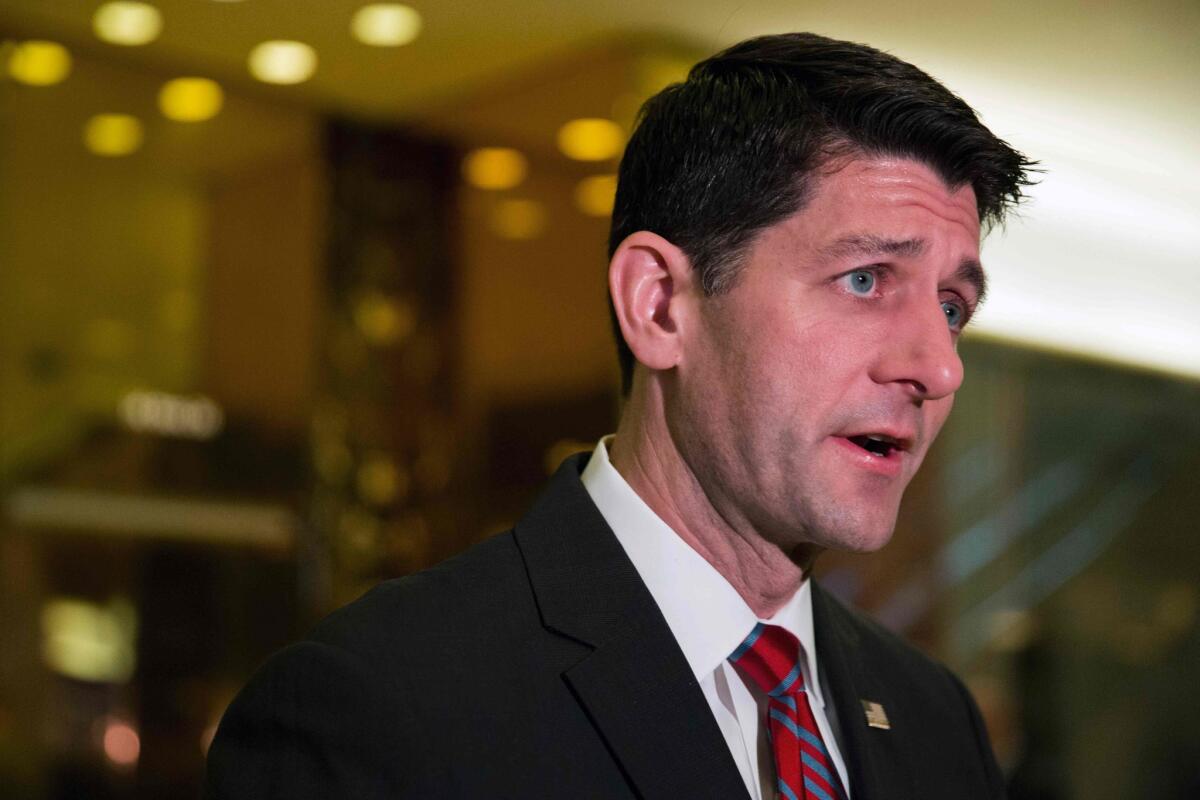Op-Ed: No sign that Congress will stand up to Trump

- Share via
Not long ago, during the presidential campaign, Republican leaders in Congress had serious qualms about Donald Trump.
Senate Republican Leader Mitch McConnell said Trump’s private remarks about women were “repugnant.” House Speaker Paul Ryan said his statements about a Mexican American judge were “racist.” Sen. Ted Cruz called him “a pathological liar” (to be fair, that was in the heat of a nasty primary campaign). Twelve of the 54 Republicans in the U.S. Senate, including Sen. John McCain of Arizona, either did not endorse or disendorsed their own party’s nominee.
But that was all before election day. Now Trump is their leader, and the same GOP skeptics are doing their best to give him a cheerful honeymoon. If you were hoping Republicans in Congress would step up to provide vigorous checks and balances on the Trump administration, the signs aren’t encouraging.
“We are committed to … working hand in glove” with Trump and his aides, Ryan said recently, before traveling to Trump Tower for a meeting with the president-elect. “If we are going to go big, we have got to hit the ground running.”
GOP senators are issuing statements supporting Trump’s nominees for cabinet positions before their confirmation hearings have been held.
Despite Trump’s populist rhetoric, his legislative program is essentially the same small-government conservatism they’ve long been preaching.
And on the first real controversy of the new administration, Trump’s insistence that he doesn’t need to divest any of his businesses while he’s in the White House, the party’s leaders are studiously silent.
“This is not what I’m concerned about,” Ryan said. “I have every bit of confidence he’s going to get himself right with moving from being the business guy that he is to the president he’s going to become…. however he wants to.”
It’s as if congressional leaders — knowing that Trump derided them during the campaign as a bunch of establishment pols who couldn’t get anything done — are subjecting themselves to a lengthy job interview, trying to win Trump’s confidence so they can handle the details of his legislative program.
“In years gone by, Congress would exercise oversight even if the president came from their own party,” said Norman Ornstein, a congressional scholar at the American Enterprise Institute. “But now the tribal instinct has taken over.”
The reasons aren’t mysterious. However improbable his election, Trump is now the undisputed leader of the party, with support from 89% of Republican voters, according to a recent CNN Poll.
And by winning, he’s given Republican leaders in Congress an opportunity they’ve yearned for since at least 1994: one-party government from the right.
“We’ve been given the responsibility to govern,” McConnell said last week. “That’s what happens when you have the same party in control of the White House, the House and the Senate.”
Moreover, the GOP leaders have noticed that despite Trump’s populist rhetoric, his legislative program is essentially the same small-government conservatism they’ve long been preaching: lower taxes, fewer federal regulations (including environmental and financial regulations) and an end to President Obama’s health insurance program.
Naturally, there are some divisions in the GOP over Trump’s policies, but they’ve been muted so far.
Republicans don’t agree on exactly how to replace the health care law, but the leadership has coalesced behind Trump’s position that the program should continue until a replacement is ready, perhaps as long as three years. (A wait that long would also push the moment of truth past the next congressional election, an advantage in the eyes of some strategists.)
Trump’s warning last week that he might slap punitive tariffs on American companies that send jobs overseas met with some mild pushback from Ryan and others who consider that kind of retaliation an intrusion on business freedom. “We believe that the best way to get at this issue is through comprehensive tax reform,” the speaker said.
And free-market, tea party Republicans are worried that Trump may propose an infrastructure plan that includes significant new federal spending.
“If he can make that work through the private sector,” it might be acceptable, Rep. Dave Brat (R-Va.), a leading fiscal conservative, told Politico. “But aaaah! It’s hard to do that.”
Brat’s was a lonely voice, though. “Deficits were a big deal for Republicans during the Obama administration, but I don’t think deficits matter much to them anymore,” said John Feehery, a former aide to the House Republican leadership.
In the face of the incoming Trump administration, the Obama-era divisions among Republicans in Congress don’t matter as much anymore. Whatever their doubts before Nov. 9, they’re all Trump Republicans now.
Twitter: @DoyleMcManus
Follow the Opinion section on Twitter @latimesopinion or Facebook
More to Read
A cure for the common opinion
Get thought-provoking perspectives with our weekly newsletter.
You may occasionally receive promotional content from the Los Angeles Times.











